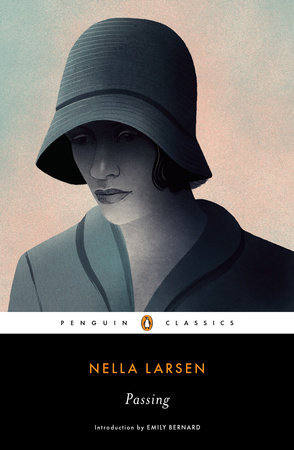 Passing by Nella Larsen
Passing by Nella Larsen Published by Penguin on January 2018 (first published 1929)
Source: Purchased
Genres: Classic
Pages: 122
Format: eBook
Purchase at Bookshop.org or Purchase at Amazon
Add on Goodreads

First published to critical acclaim in 1929, Passing firmly established Nella Larsen's prominence among women writers of the Harlem Renaissance.
Irene Redfield, the novel's protagonist, is a woman with an enviable life. She and her husband, Brian, a prominent physician, share a comfortable Harlem town house with their sons. Her work arranging charity balls that gather Harlem's elite creates a sense of purpose and respectability for Irene. But her hold on this world begins to slip the day she encounters Clare Kendry, a childhood friend with whom she had lost touch. Clare—light-skinned, beautiful, and charming—tells Irene how, after her father's death, she left behind the black neighborhood of her adolescence and began passing for white, hiding her true identity from everyone, including her racist husband. As Clare begins inserting herself into Irene's life, Irene is thrown into a panic, terrified of the consequences of Clare's dangerous behavior. And when Clare witnesses the vibrancy and energy of the community she left behind, her burning desire to come back threatens to shatter her careful deception.
Brilliantly plotted and elegantly written, Passing offers a gripping psychological portrait of emotional extremity.
More of a novella than a novel, Passing starts with a chance encounter at a tea shop between Irene Redfield and Clare Kendry. Once childhood friends in Harlem, New York, Irene and Clare are separated when Clare decides to leave the Black community behind, to ‘pass’ for white, marry a white man, and live as a white woman. While the two women catch up, Clare asks Irene if she could come to one of her parties, explaining that she misses being around Black people. Irene agrees and then she meets Clare’s racist husband. Irene is shocked and angry. She lives within the African-American community, is married to a black man, and is anxious about passing though she does it when convenient, like at the tea shop. In fact, Irene’s biggest desire in life is for security, while Clare is a risk-taker.
A couple of year later, Clare reaches out to Irene again, and begins spending more time with Irene, her family, and her friends in Black Harlem. Clare joins Irene and her husband at the best clubs and parties where the Harlem literati and intelligentsia meet not caring that her husband will discover her identity. Irene becomes more and more uncomfortable with Clare’s presence. Not only is it threatening Clare’s place in society, Irene believes it is threatening her marriage and her safe world.
Larsen packs so much into this short book, making full use of each scene, each word. The characters are so real and complex. The main theme, obviously, involves race and identity, and still feels relevant. But there’s also love and jealousy and attraction and motherhood. And the tension builds to an ending that manages to be both surprising and inevitable.

Very nice review. I read this book a few years ago and enjoyed it.
I think I read it in college, but didn’t remember it much from then.
I loved this book when I read it. Your review makes me want to go back and read it all over again. 🙂
She packs such a powerful into such a short book.
The story sounds intriguing. Imagine living your whole life with a pretense must be so very hard.
Forever being worried about being “caught.” On the other hand, Clare, unfortunately, was treated by society as a whole better than she ever would have been if they had seen her as black.
Sounds powerful. I can’t imagine how harrowing pretending and hiding your identity 24×7 would have been. I hope she makes peace with it by the end of the book.
I don’t want to give away the ending, but it was not the ending I would have hoped for.